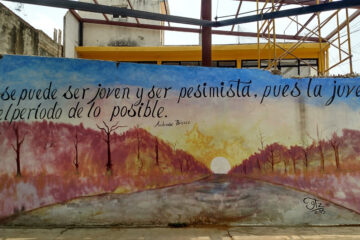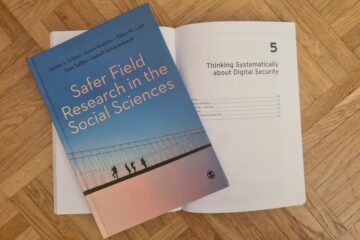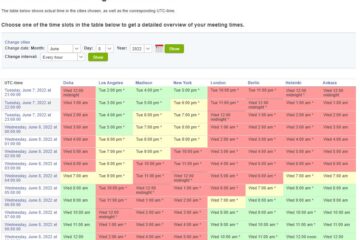by: Thomas S. Benson, University of Delaware
My research explores environmental sustainability in cities, and smart cities. My dissertation focuses on four cities – Washington D.C. and Boston in the U.S., and Leeds and Bristol in the UK – which I examine on two fronts. First, extant literature often suggests that self-proclaimed smart cities that integrate technology into local governance models are the panacea for all societal ills, including the lack of environmental sustainability. For my dissertation, I wanted to assess how well rhetoric matched reality. Second, I set out to analyze each local authority’s urban governance structure – degrees of autonomy, accountability, citizen participation, among other things – to identify if there was a relationship between variance in these structures and local environmental outcomes. For example, do higher levels of citizen participation lead to ‘better’ local environmental outcomes? Acknowledging the impact of the COVID-19 pandemic and that my research would be conducted in the midst of it, I also evaluated the hypothesis that virtual citizen participation would be less effective than in-person participation in leading to better local environmental outcomes.
Following the successful defense of my dissertation prospectus in September 2020, and not knowing what laid ahead with the pandemic, I chose to focus on developing the initial chapters of my dissertation – introduction, theory, hypotheses, methodology – in Fall 2020 and Spring 2021. I sought to keep updated with relevant literature, downloaded city-specific documents, and created a list of potential contacts to reach out to.
I also began to more clearly plan how to conduct interviews related to the dissertation in the four cities that I had selected to study. As I had learned to navigate my studies around and live with the pandemic since March 2020, it had become clear to me that in-person interviews were very likely to be unmanageable. This was even more so the case given that I intended to conduct interviews with city officials – for my research, anyone employed by a local authority – who often had strict protocols regarding interacting with constituents. I assumed I would be subject to the same restrictions. In this timeframe, I also completed my Institutional Review Board (IRB) training and certification for engaging with human subjects as part of my research. I received this in March 2021.
By May 2021, I had a comprehensive spreadsheet that included contact lists for the four cities, and had additional color-coded columns devoted to recording dates for when I would: (i) send the first email, inquiring about the prospect of an interview; (ii) receive the initial response from the potential interviewee (if any); and (iii) send a follow-up email, if I received no response from the first one. I also had two further columns for (iv) the date of when the interview was conducted or if there was no response, or they declined; and (v) whether the respondent wanted any data from the interview to be anonymized.

Conducting Interviews
Prior to embarking on my dissertation fieldwork, I had no fieldwork experience or experience conducting interviews. I was familiar with Zoom, having participated in virtual classes, but not the features that would eventually come to be crucial – closed captions, recording, and an automatic transcription service. The thought of conducting interviews was thus initially daunting. I was concerned about how to interact with interviewees in a way that would not bias my results but would also develop rapport. I attended the Institute for Qualitative and Multi-Method Research (IQMR) in June 2021, and this was very helpful in learning the norms and customs associated with interviews and best practices for conducting interviews. For example, I decided to incorporate a question into interviews to assist with snowball sampling to broaden the pool of potential interviewees, as well as reach out to academics, non-profit experts, and journalists to provide perspectives on urban sustainability and governance that I may not have otherwise known about had I solely interviewed city officials. Remaining neutral and avoiding normativity, explicit hypotheses, and jargon were key in ensuring a smooth flow through interviews.
I began to send out emails requesting virtual interviews in early May 2021. By the end of May 2021, I conducted my first interview and had emailed many other potential interviewees. Initially, my response rate was low. Over the course of several months, I tweaked my emails and my response rate improved. In the new, modified version, I shortened the description of my research to be concise and I reduced the expected interview time, still proposing an hour but offering the alternative of a shorter 30-minute interview. These changes were crucial for time-constrained city officials who did not have time to read longer emails or commit much time for an interview. I also employed snowball sampling in my interviews by asking for potential contacts respondents believed could speak to my research to try to identify more people to interview.
I was very fortunate to receive a Dissertation Fellowship from the University of Delaware, which provided me with an income throughout Summer 2021, and relieved me of Teaching or Research Assistant duties in the 2021-2022 academic year. In July 2021, I received a grant from the University of Delaware to conduct in-person interviews in Washington D.C. and Boston, although many respondents preferred to be interviewed virtually.
Although I conducted more interviews virtually than in-person, I felt as though the information I obtained from both was valuable. The physical setting of an in-person environment and the face-to-face interaction was not, in my opinion, significantly different from that of a virtual interview. It was great to get a closer look at the environments that interviewees were operating in on a regular basis for their work in the in-person interviews. Nonetheless, with virtual interviews, the occasional interruption from noisy children or pets actually served to build rapport because I could relate in having pets of my own and this helped to put both the interviewee and me at ease. With regard to power imbalances, academic literature often speaks to the power dynamics of interviews and how interviewers should avoid wielding their privileged position to create an imbalanced relationship with the interviewee. In my experience, I often felt as though my interviewees wielded the power – whether it was because of the cultural and public respect for them as city officials or myself being a graduate student and lacking the title of ‘Dr’. For me, this dynamic did not change between in-person and virtual interviews.
Although I originally intended to conduct all my interviews in summer 2021, it was clear by the end of August that this was not enough time. I had conducted most of my interviews for Washington D.C. and some for Boston, but I had not even started my interviews for city officials in Leeds and Bristol. I came to the realization that drafting emails, tailoring emails to each interviewee, customizing interview questions where appropriate, and identifying additional potential interviewees was more time-consuming than I first anticipated. Tracking interview progress with spreadsheets (e.g., recording interview dates and noting when to follow-up), utilizing Google Calendar to schedule interviews, learning the features of Zoom and Microsoft Teams (e.g., recording to cloud, closed captions, transcriptions), and sending reminder emails and thank you emails also took time. However, all of this organization came to fruition – between mid-May 2021 and mid-December 2021 I conducted 52 research interviews across all four cities, as well as with some other experts in relevant areas.

Challenges
Challenges of several types arose as I conducted interviews. Perhaps the most important thing dealing with these challenges taught me was that I needed to treat fieldwork like a full-time job to give myself the flexibility to schedule, prepare, and conduct interviews. During the period that I was interviewing, I could only spend whatever time was left after dealing with interviews working on other aspects of my dissertation. For graduate students without fellowships or assistantships, it is especially important to utilize the summer period to conduct fieldwork as there are often fewer other responsibilities during the summer. Importantly, virtual fieldwork can blur the distinction that is typically drawn with in-person fieldwork between gathering data in a different physical setting, and then returning home to write. With “digital fieldwork”, data collection is largely carried out from home, creating the sensation that you really “ought to” be writing your dissertation. Virtual fieldwork also offers opportunities for making quick connections between interview data and dissertation writing, thereby saving time and contributing to that same sensation. Yet in reality, virtual fieldwork can be as demanding – and leave as little time for writing – as in-person fieldwork. For example, there were several instances in which I had back-to-back virtual interviews due to city officials’ limited availability, leaving me feeling just as constrained as I would have felt if I had been conducting in-person fieldwork and changing locations between interviews.
Other challenges related to the fact that interviews, regardless of medium, require flexibility. The degree of flexibility required was more than I had imagined. This was especially the case in conducting interviews virtually. I quickly came to realize that as soon as I had received a response expressing interest in participating in an interview, I needed to ensure I was always readily available during the time established for the interview, but also before and especially after. For instance, the business of city officials sometimes meant that there were last-minute changes, or some were a little late; others cancelled at the last minute or did not show up. Although I considered my organization skills to be effective, these events were certainly a test of my ability to manage my time and to not get bogged down with last-minute cancellations.
In order to address these challenges, I began to limit the number of interview invitation emails I was sending out at any one time and reduced my other commitments. Also, as noted earlier, while I had originally intended for interviews to last an hour, I adapted to the hectic schedules of some city officials, suggesting that interviews would preferably be one hour but that I would also greatly appreciate a 30-minute conversation, should they be short on time.
There were also a handful of instances of being ghosted, which I never expected. These were situations in which a potential interviewee had agreed to participate in an interview or expressed interest and then either did not show up or did not respond to follow-up scheduling emails. At the time, it was difficult – as someone in the early stages of an academic career – to not take these instances to heart and blame myself. Was my email poorly written? Is my research boring? These were questions I dwelled on at the initial stages of my fieldwork. Later, I learned to develop a thick skin and move more quickly past these instances, reminding myself of the kind comments I had received from interviewees about my project and that it was a worthwhile pursuit. Additionally, talking to your dissertation committee or advisor for reassurance that you are on the right track as a graduate student is helpful to maintain confidence and enthusiasm. Similarly, talking to colleagues helped identify commonalities – that I was not alone in my experiences.
To allay fears about whether I would be able to collect the data I needed, I also decided to broaden my scope of potential interviewees. I began with no existing network and contacting city officials out of the blue was difficult. So, as noted earlier, I also reached out to a few journalists, non-profit leaders, and academics who could speak directly to my subjects of interest – environmental sustainability in cities or smart cities (or both). Additionally, rather than only seeking to speak to high-ranking city officials (e.g., a Chief of department), I diversified my pool of potential interviewees to include staff members of those officials or policymakers working in relevant areas. This provided me with a broader array of perspectives that, in retrospect, I am very glad that I pursued.
While adopting this flexibility, and making these adjustments, were manageable for interviews with city officials in Washington D.C. and Boston (given the same time zone), they were more problematic with my virtual interviews with city officials in the UK. For the most part, the time difference was eight hours, which meant I often had to wake up early and make myself presentable for interviews. The changes in clocks – backwards and forwards – did not help either, especially when it came to scheduling interviews. I was fortunate that many city officials were flexible and willing to participate in interviews in the afternoon (UK time, GMT), whilst I could conduct them in the morning (not at an ungodly hour) (U.S., ET).
Finally – and perhaps not unexpectedly – there were a few technological crises. This included things like poor connection, which was sometimes the case when conducting interviews with city officials in the UK. Fortunately, there were usually workarounds, such as repeating what I had said, using closed captions, and buying a new webcam, microphone, and headset (not cheap!). In one instance, it also meant switching from a Zoom call to a phone call for the interview. However, none of these issues led to interviews being terminated because of the quality. Even when the quality suffered, interviews were still conducted, and questions were repeated to ensure interviewees understood what they were being asked.

Benefits
Despite the challenges I encountered in conducting virtual interviews, there was an abundance of benefits, many of which I often feel are overlooked. The first benefit – the biggest one – is that conducting interviews virtually saved me time and money. As a graduate student, funding is already limited, and needing to travel to Washington D.C., Boston, Leeds, and Bristol to conduct every single interview was out of the question from the outset. Despite the pandemic’s horrible consequences, it created circumstances that facilitated virtual interviews. It boosted peoples’ familiarity with software like Zoom and Microsoft Teams, and this meant many city officials – who were already using the software for meetings – were willing to participate in an interview virtually. If I had tried to conduct these interviews prior to the COVID-19 pandemic, I imagine it would have been difficult to persuade city officials to download software they were unaware of and did not know how to use, especially given their tight schedules.
Taking notes was also less daunting. In every case, I was able to mute myself when not talking to take notes as I listened, without the sound of keys disrupting respondents’ thought processes. Zoom and Microsoft Teams also enabled me to record – where consent was provided – meetings and use closed captions when needed. Zoom also offers an automatic transcription of individual sessions, which has helped with the transcription process. Furthermore, I was able to conduct interviews nearly back-to-back (leaving me enough room in between to prepare for the next), which I would not necessarily have been able to do had interviews been in person (assuming not all city officials are housed in their respective City Halls at the same time).
Interestingly, building rapport was not an issue, which I had expected. Instead, I found the virtual medium to be conducive to building rapport in many cases – be it interviewees forgetting to unmute themselves or young children or pets entering the room mid-interview. This helped to defuse any tension that was present under the pretence that the interview was a very serious affair. In addition, I think the familiarity that many interviewees had with Zoom meant that they did not experience virtual interviews radically differently from how they would have experienced in-person interviews. Yet I also noticed that some respondents seemed aware of the differences that being interviewed on Zoom made and tried to compensate for them. For example, given the visual limitations – typically head and shoulders in view – I noticed many people used vocal cues to express that they were thinking, as opposed to looking around as though in search for answer.

Concluding Thoughts
Overall, conducting virtual interviews was a worthwhile endeavor. It gave me the critical exposure to and experience in fieldwork, which formed an important part of my dissertation. I have also been fortunate to receive a grant as part of a successful application to Princeton’s Dissertation Scholars Program, which will provide me with additional funds to conduct interviews in spring 2022 – this time, hopefully, in-person in Washington D.C., Boston, Bristol, and Leeds.
In retrospect, I enjoyed conducting interviews virtually and I think it had many benefits for me, as a graduate student, and for city officials – all of whom are very much constrained by time. The lack of funds as a graduate student also meant that I was able to conduct many interviews across an eight month period, more than I would have been able to conduct had the interviews exclusively been in person. Time has been saved with easy access to recordings, interview notes, and transcriptions. Virtual interviews have also taught me that relationships can be built successfully in a virtual format, with many interviewees expressing interest in reading the finished dissertation and wishing me success. For anyone who is hesitant about conducting interviews, or who is perhaps holding off until the COVID-19 pandemic comes to an end, I would recommend that you try conducting interviews virtually or open yourself up to the prospect of conducting some virtually and others in-person. Some sensitive topics may warrant in-person interviews, but virtual interviews – especially for graduate students with limited funding – have been a blessing for me.


